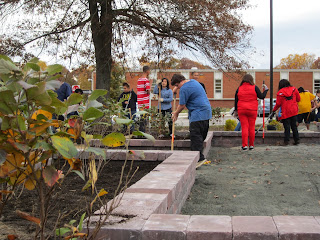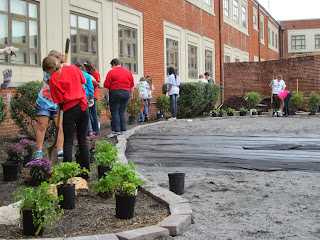By Amber Ellis, JRA's Watershed Restoration Associate/Volunteer Coordinator
The James River Association received a grant from the US
Fish and Wildlife Service to engage teachers and students at two urban schools
in creating schoolyard habitats at their school and in programs at the James
River Ecology School at Presquile NWR.
This project ties urban schools to the National Wildlife Refuge System
and to the restoration of wildlife habitat in their communities’ backyard. The
two schools that were selected were Falling Creek Middle School in
Chesterfield, VA and Colonial Heights Middle School in Colonial Heights, VA.
JRA’s Education Manager, Jessica Templeton, and JRA’s
Watershed Restoration Associate, Amber Ellis, went to each school in early
September to teach the students about the type of elements that are needed in a
schoolyard habitat and the students came up with their own designs for what
they wanted to see at their school. All of their designs had to address the
need for wildlife (food, shelter, water), and for people (spaces to learn, accessibility,
visual interest). The students’ designs were taken into consideration and
combined into final plans that were implemented this fall.
Students at Falling
Creek Middle School developing their designs.
Falling Creek Middle
School (FCMS)
At FCMS, the theme that the students wanted was a bird
habitat. The design for their habitat includes a defined outdoor classroom that
is surrounded in raised beds. In the center of the classroom there will be a
paw print made out of pavers. Many of the students wanted to include this
design element because their mascot is a panther. Multiple layers of native
vegetation were planted to encourage bird habitat with understory trees and
shrubs. Native fruit producing shrubs such as Blueberry and Winterberry, as
well as American Holly, and Dogwood were planted to provide food for birds. The
students wanted a Weeping Cherry, so we included a native alternative, Weeping
Redbud, which will be beautiful next spring.
All of the installation took place over four days in November.
Big thanks go out to the Old Dominion Chapter of the
Interlocking Concrete and Pavement Institute (ICPI), particularly a team from Homescapes , Ltd. who donated their equipment and labor to build
the garden walls, as well as Newline
Hardscapes that provided a great discount on the block material. The
students planted 50 native plants in two days! Teachers will be helping
students make plant tags and stepping stones in the classroom that will be added
to the garden.
You can see some of the Falling Creek students’ original
designs here.
Falling Creek Middle
School site before.
Students planting the
garden at Falling Creek Middle School.
Falling Creek Middle
School after the installation of the Habitat Garden.
Colonial Heights
Middle School (CHMS)
The big theme that came from the students at CHMS was to
create a garden that attracted pollinators. The design includes a classroom
area that is filled with picnic tables and a reading area with picnic benches. The
benches were built and funded by Capital One. This seating area is surrounded
by native plants that provide value to pollinators, such as butterflies, moths,
and bees. Some of the plants include Echinacea, Black-eyed Susans, Viburnum,
Summersweet Clethra, Aster, and Butterfly Weed. The installation took place
over three weeks in October. The first Tuesday about 15 adults helped prepare
the site by spreading soil, stone dust, and edging. The second Tuesday about 30
students came out to install 80 plants! Volunteers from Capital One came out
the third week to build the picnic tables and benches and worked with the
students to build and paint birdhouses, and make plant tags and stepping stones.
You can see some of the Colonial Heights students’ original
concept designs here.
Colonial Heights
Middle School site before.
Students installing
the plants at Colonial Heights Middle School.
Colonial Heights
Middle School after the installation of the Habitat Garden.
The US Fish and Wildlife Service Schoolyard Habitat and
Outdoor Classroom Program have helped schools across the country create
wildlife habitat and spaces for children to learn outside. These gardens serve
a unique role in reconnecting the students and teachers to the natural world,
while also providing habitat for wildlife.
Big thanks also go to these groups that helped with the
efforts at Falling Creek Middle School.
1. Homescapes: Their crew dedicated 5 days of labor
and use of equipment. www.homescapesltd.com
2. BWS Landscaping: Their crew pulled a much needed
half day to get things ready for the kids. www.bwslandscaping.com
3. NewLine Hardscapes, LLC: Miles Clarkson is one
of the owners of NewLine and president of the ICPI Old Dominion Chapter. Nelwine discounted the hardscape products by
75% for the project. We are a local manufacturer that is happy to help out in
our community. www.newlinehardscapes.com
4. ICPI Old Dominion Chapter | ICPI: We are a
non-profit dedicated to growing the hardscape industry. This event helped train train members and
their crews and give back to the community. www.icpiolddominionchapter.com








No comments:
Post a Comment